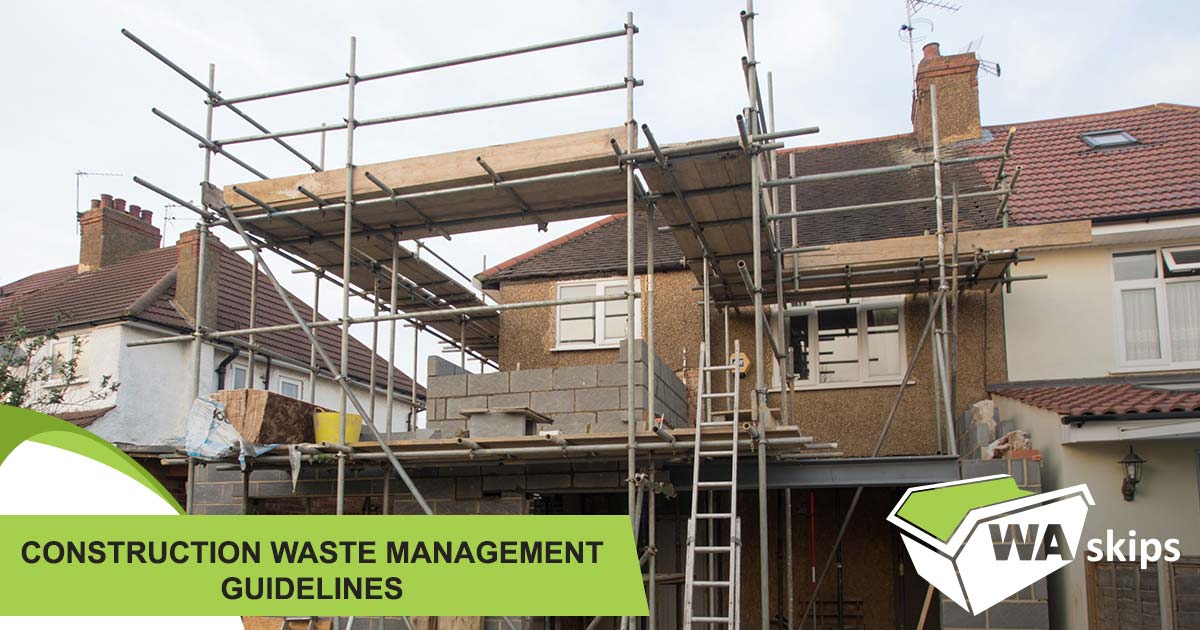
It’s vital to properly have and follow construction waste management guidelines. In a construction project, it’s important to reduce pollution and maintain a cleaner environment. So it’s best to follow responsible practices in consistently disposing of construction waste properly to keep the environment greener and safer.
What Is Construction Waste?
Construction waste is a type of waste produced during the process of demolishing, building or renovating. These include:
- concrete and bricks
- asphalt, rocks, and soil
- steel and pipes
- glass
- plasterboards
- timber
- cardboard and papers
- plastics
- vegetation
- asbestos and contaminated soil
If you improperly manage construction waste, it can harmful to the environment and to human health.
Where Does Construction Waste Go?
Construction waste is often sent to a recycling facility or a transfer station. The majority of them are privately owned. They usually charge by weight, and also need to charge an additional waste levy.
In Australia, sometimes the construction waste is shipped overseas to be sold. However, we have regulations for this. only processed recyclable materials are allowed to be shipped. Materials like plastic, paper, glass, and tires are allowed to be sold to other countries.
For instance, a single type of plastic can be cleaned and processed into flakes. Or a crushed glass is ready for the furnace to be turned into other glass products.
So, by principals, construction waste does not fit in landfills.
Construction Waste Management Methods
Reduce. Select what to buy carefully to avoid purchasing unsuitable items that will eventually end up in a landfill. For instance, you can easily avoid purchasing unnecessary material created by offcuts, for example, timber and pipes, and shift to buying materials of appropriate lengths and sizes.
Reuse. Some of the construction materials or waste that are not useful to you might be a treasure to someone else. You can donate old appliances or décor items that might be extremely valuable to some needful people around you. It’s vital to think about some of the leftover materials that you can repurpose for another project, for instance installing windows, roof tiles and bricks.
Recycle. Recycling items can save more energy than producing new items. Besides, many items are recyclable; this includes paper, metal, wood, plastic, plasterboard, asphalt and glass. Thus, it’s vital to ensure that your recyclable waste is sorted out together so that the waste removal facilities can collect, dispose of and process it properly.
Construction waste recycling is one of the easiest, most efficient and environmentally friendly ways to dispose of waste effectively.
How to Manage Construction Waste
Look at every aspect of your construction project and manage the waste so it can be more sustainable.
1. Have a construction waste management plan
By having a construction waste management plan, you can assess any potential effects that a project might have on the surrounding environment. It can assist you in making strategies to prevent, minimise, offset, or manage your construction waste. It makes sure your actions are appropriate from an environmental standpoint.
2. Follow the waste management methods in this order: Avoid, Reduce, Reuse and Recycle
- Plan ahead what materials to buy, how much, and when you buy them.
- Storing surplus materials for use at a later time.
- Find sources that sell used materials like timber, soil, or concrete. You may get them cheaper than new ones.
- Sort and recycle the excess materials to reduce contamination.
3. Dispose of construction waste properly
Hiring a skip bin is one of the best solutions for disposing of construction waste. You can also hire the services of a C&D waste disposal company.
Skip bins ranging from 6m3 to 10m3 can efficiently manage waste generated by enormous construction and demolition waste materials.
But remember contaminated soil or asbestos cannot be disposed of using a skip. They have to be handled differently.
4. Keep up with the latest policies and industry best practices
Innovations related to construction waste management are continually evolving as a result of technology. Make sure your project is compliant. Research the waste management policies of your local and state government. Stay up to date.
5. Get the local community and relevant parties involved
Construction and demolition have an impact on local communities. By including the community as early as possible in the process, you may lower the risk to your project and, frequently, enhance the finished project.
Hire a Skip Bin for Your Construction Waste Disposal
At WA Skips, we provide skip bin hire services that significantly help get rid of construction waste easier and more effectively. We have an extensive range of skip bin types and sizes, which we provide at affordable and cheapest skip bin hire Perth prices. If you are searching for ‘construction waste disposal near me’, look no further since WA Skips will collect and dispose of your construction waste for recycling.
If you are unsure of the right skip bin size for you, reach out to our friendly and knowledgeable support team, who will find the right bin that suits your needs and answer any of your questions or inquiries. Contact our reliable and professional support team today at (08) 6117 8119 to learn more about services and get prompt waste collection services.
WA Skips is a reliable service company that provides rubbish removal in Perth and complete waste disposal services. They also offer an extensive range of skip bin sizes to efficiently collect and dispose of your construction waste.

